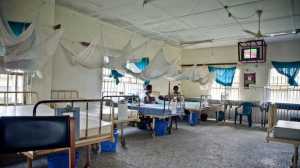
Nigeria’s healthcare system is ranked fourth-worst in the world in a recent World Health Organization survey. This is unsurprising to Nigerians who live in a country without ambulance services or a simple toll-free number to call in an emergency.
The coronavirus pandemic has prompted a review of health structures in many nations throughout the world, and the focus of this article is on assessing the pandemic’s impact on Nigeria’s health sector.
Background
At a time when people are living longer on average, with a global average life expectancy of 73 years, the average Nigerian will be lucky to reach 60. Nigeria, after the Central African Republic, Lesotho, and Chad, has one of the lowest life expectancies in the world, with a 55-year life expectancy, according to the latest United Nations data.
For decades, Nigeria’s health sector has been severely underfunded, while the country’s leaders have flown off to the United Kingdom and Dubai to receive medical treatment that they have blatantly denied their countrymen. Even Nigeria’s number one citizen would avoid the healthcare system he oversees, preferring instead to patronize the health services constructed by his colleagues in the United Kingdom, at significant cost to the Nigerian purse.
Abuja Declaration of 2001
Nigeria was among the African Union states that committed to 15% of its annual budgetary allocation going toward health on April 27, 2001, in Abuja. However, a review of the budgetary allocation of Nigeria between 2001 and 2019 shows that the health sector barely averaged 5% in those years. Many Nigerians who are familiar with budgetary allocation are not surprised by this reality. However, with the onset of the COVID-19 pandemic, which rattled the health systems of many countries throughout the world, there was renewed hope among Nigerians, bolstered by comments from government officials during the epidemic’s peak that the health sector’s degradation would be remedied.

Comparative Analysis of Health Budget Before and After COVID-19
The Federal Ministry of Health (FMOH) received N339.38 billion in 2014, accounting for about 7.2 percent of the budget. Despite the fact that the FMOH budget was increased to N347.26 billion in 2015, it only accounted for 6.8% of the entire budget. Between 2016 and 2020, the budgetary allocation percentage dropped below 6%, varying between 4.1 percent in 2016, 4.0 percent in 2017, 5.79 percent in 2018, and 4.18 percent in 2019.
Despite the fact that Nigeria did not register a case until February 2020, the health ministry was given N463.80 billion on the eve of the coronavirus pandemic, accounting for 4.16 percent of the overall budget. The health sector received N547 billion in 2021, accounting for 7.01 percent of the budget; the highest percentage in the last 5 years. In the proposed budget for 2022, N816 billion has been allocated to health expenditure representing 4.93% of the budget. A comparison of the three budgets for health since the pandemic shows an average of 5.3% of the accumulative budgets. It is also crucial to note that the increase in the proportion of the health budget for 2021 should not be attributed to the necessity to acquire vaccines to combat the virus’ spread, as parliament separately approved a total of 982.7 billion naira for vaccines.
In light of the foregoing, it is clear that the coronavirus pandemic has resulted in little and not a ground-shifting improvement in the health sector’s development. This is evidenced by the National Association of Resident Doctors’ industrial action from August to October 2021 during the peak of the Delta variant.




